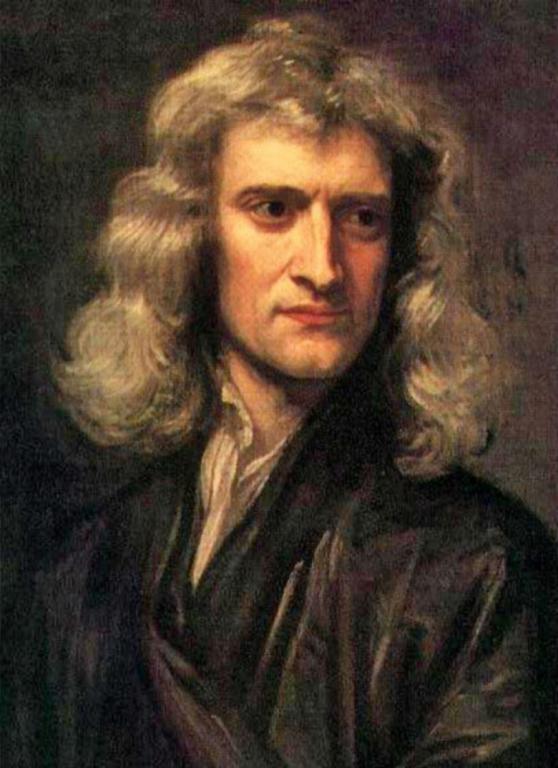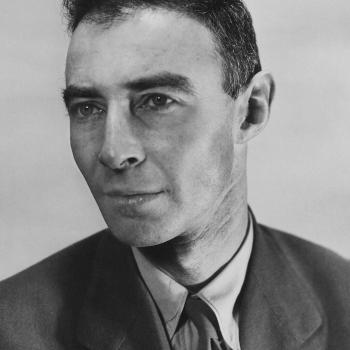 Sir Isaac Newton (1643-1727) is regarded as one of the two greatest physicists and mathematicians in all of human history, the other being Albert Einstein. Newton is most known for formulating the laws of motion and universal gravitation. But Isaac Newton wrote more about Christian theology and alchemy (much of which is today regarded as genuine chemistry) than he did of science and mathematics, yet this has been largely unknown until recent decades.
Sir Isaac Newton (1643-1727) is regarded as one of the two greatest physicists and mathematicians in all of human history, the other being Albert Einstein. Newton is most known for formulating the laws of motion and universal gravitation. But Isaac Newton wrote more about Christian theology and alchemy (much of which is today regarded as genuine chemistry) than he did of science and mathematics, yet this has been largely unknown until recent decades.
This public ignorance about Isaac Newton is mostly because he refused to publish his works on theology and alchemy since he would have been regarded as a heretic in religion and a crackpot about alchemy. Moreover, Isaac Newton kept these matters to himself except that he divulged much of it to his inner circle. In theology, these friends of Newton included John Locke, from whom Thomas Jefferson derived much of his thinking about freedom, and Samuel Clarke, who was chaplain to Queen Anne. Both men were philosophers and theologians. Clarke was Arian and Locke was slightly Deist. Newton was neither, yet he has been falsely accused of being both.
Yesterday, I posted about the new book about Sir Isaac Newton, The Priest of Nature. Newton was a devout student of the Bible and the theology of church fathers. I agree a lot with Isaac Newton’s theology, especially his anti-Trinitarianism. (I was a Trinitarian for 22 years until, like Newton, I read myself out of it in the Bible.) Now I will post an excerpt about Sir Isaac Newton from my book, The Restitution of Jesus Christ (2008), which is a thoroughly in-depth study about the Bible not saying Jesus is God, in which I cite over 400 scholars (this book is available for now only at kermitzarley.com):
Sir Isaac Newton: A Secret Arian? [1]
The most renowned English anti-Trinitarian of the 17th and 18th centuries was the brilliant Sir Isaac Newton (1642-1727). One of history’s greatest mathematicians and scientists, Newton is most famous for discovering gravity. Like [John] Milton, he was a devout Christian and a theological writer. Only in recent years has it become known that Newton wrote more on theology and alchemy than on mathematics and science combined. He especially studied biblical prophecies and often testified that the fulfillment of them strengthened his faith immeasurably in the existence and providence of God.
Many conflicting opinions have been written about Sir Isaac Newton’s theological proclivities. This is partly due to his obsession to remain publicly silent about his anti-Trinitarian views in order to avoid being drawn into controversy. Newton, however, was quite conversant about his unorthodox theology with his closest friends, especially those included in what became known as “the inner circle of Sir Isaac Newton.” John Locke was the first person Newton talked to about his anti-Trinitarian views. Locke, with whom Newton carried on an extensive literary correspondence, once wrote of Isaac Newton’s “great knowledge in the Scriptures, wherein I know few his equals.”[2]
In order for Sir Isaac Newton to continue his illustrious career at Cambridge, it became necessary that he meet the requirements of ordination to keep his fellowship. But the thought of becoming an ordained minister in the Church of England caused him much consternation. Why? Subscription! He believed there were serious discrepancies between the Church of England’s Thirty-Nine Articles and the nt as well as between the Articles themselves. In all good conscience, Newton wasn’t sure he could subscribe to all of the Articles. For instance, Article One is about the Trinity and Article Two affirms classical incarnation, eternal generation, and two-nature Christology. Yet Article Six reads: “Holy Scripture containeth all things necessary to salvation; so that whatsoever is not read therein, nor may be proved thereby, is not to be required of any man, that it should be believed as an article of the Faith, or be thought requisite or necessary to salvation.” This matter about the Trinity disturbed Newton immensely. So, in 1672, Sir Isaac, who was a voracious reader, laid aside his other work and plunged into a deep study of the nt and patristic writings of the 2nd through the 4th centuries. This ordeal lasted over three years. In the meantime, Cambridge officials wouldn’t wait on his decision; they resolved their dilemma by invoking a special dispensation in order to establish a new chair for Newton.
Much has come to light in the late 20th century regarding the secret theological beliefs of Sir Isaac Newton. What was his theology? He regarded the Bible as divine revelation and thus the sole source for determining answers to questions about God that go beyond natural revelation. The primary precept of his faith was that “whenever it is said in the Scriptures that there is one God, it means the Father.”[3] Newton’s foremost christological text that he used to support this maxim was 1 Cor 8.6. Thus he writes, “We are forbidden to worship two Gods, but we are not forbidden to worship one God and one Lord.”[4] Newton also distinguished degrees of worship; he assigned ultimate worship to God as Creator and a lesser worship to Jesus Christ as God’s agent in both creation and redemption. He argued that worshipping two or more beings equally, as in the doctrine of the Trinity, is an infraction against the First of the Ten Commandments and is therefore idolatry. (Interestingly, and just the opposite, during the Arian Controversy of the 4th century the orthodox party accused the Arians of idolatry for believing in, and therefore worshipping, the Father as God but Jesus Christ as “a demi-god.”)
Like the Arians and apologists before them, Newton cited Jn 1.1c in contending that both the Father and the Logos are god, but the Logos only in a secondary, derivative sense. Newton thus subscribed to the personal preexistence of Jesus as the Logos; but he insisted that this precept is unessential to saving faith. He rightly claimed that in at least the 2nd century ce, Christians who believed in the personal preexistence of Jesus did not regard those professing Christians who believed otherwise as heretics devoid of salvation. Consequently, this preexistence issue, which Newton knew quite well was the decisive factor distinguishing Unitarians and Arians, he deemed insignificant.
Therefore, it generally has been thought that Isaac Newton was Arian in theology; but this is really incorrect, and he detested the Arian label. Newtonian scholar Stephen D. Snobelen concludes, “Attempts to align Newton with any single theological tradition will end in failure. Newton was an eclectic theologian.”[5]
Isaac Newton has also been falsely accused of being a Deist by denying divine immanence. Not true! He taught the very intriguing concept that God does not directly accomplish any activity that He can delegate to others. Newton articulates this principle most succinctly by saying, “God does nothing by himself which he can do by another.”[6]
Newton faults the Arians, Athanasius, and most ante-Nicene and Nicene church fathers for allowing Greek and Gnostic teachings, as well as unscriptural language, to infiltrate the Church. He contends that the primary way to understand God is as the moral and good Sovereign of the universe. Newton thus dismisses metaphysical concepts—described by using such words as “substance,” “essence,” “eternal generation,” and “consubstantiality”—as being beyond both the realm of scientific observation and, more importantly, the revelation of Scripture.
Isaac Newton was much more anti-Athanasius than pro-Arian, and he could not withhold proclaiming it. Though abhorring disputes, he risked controversy by publishing a book most critical of Athanasius.[7] In it, he repeatedly indicts Athanasius for “forgery” in falsely representing patristic writings and lying about historical events to strengthen his theological position. Newton heaps mountains of scorn on Athanasius for the doctrinal corruption the Church suffered on account of the Arian Controversy. He admits that his severe judgment of Athanasius is due to his feeling personally embarrassed at Athanasius having frustrated the purposes of God and causing Newton the personal aggravation of having to keep much of his own theological beliefs private. AMEN, brother!
One of Sir Isaac Newton’s friends, Hopton Haynes, claimed that Newton once told him, “the time will come when the doctrine of the incarnation shall be exploded as an absurdity equal to transubstantiation.”[8]
[1] Much of what follows about Isaac Newton is gleaned from M. Wiles, Archetypal Heresy, 77-93.
[2] E.S. De Beer, ed, The Correspondence of John Locke, 8 vols. (Oxford: Clarendon, 1979), 7:772-74 (=no. 3275 of April 30, 1703). Indebted to M. Wiles, Archetypal Heresy, 78-79.
[3] Yahuda ms 14, p. 25. Indebted to M. Wiles, Archetypal Heresy, 79n80. All subsequent citations of Isaac Newton’s writings herein are taken from this book by Wiles.
[4] Yahuda ms 15, p. 46.
[5] Stephen Snobelen, “Isaac Newton, heretic: the strategies of a Nicodemite,” www.isaac-newton.org, 416.
[6] Martin Bodmer MS 9 (CH 18.88), p. 1. Indebted to M. Wiles, Archetypal Heresy, 83n99.
[7] Isaac Newton, Paradoxical Questions concerning the morals of Athanasius and his followers (c. early 1690s; Keyes ms 10). See also R.P.C. Hanson, “The Behaviour of Athanasius,” in Hanson’s The Search for the Christian Doctrine of God: The Arian Controversy, 239-73.
[8] S. Snobelen, “Isaac Newton, heretic,” 389. Taken from Richard Baron, Cordial For Low Spirits, 3 vols. (London, 1763), 1:i, xviii-xix.
………………
To see a list of titles of 130+ posts (2-3 pages) that are about Jesus not being God in the Bible, with a few about God not being a Trinity, at Kermit Zarley Blog click “Chistology” in the header bar. Most are condensations of my book, The Restitution of Jesus Christ. See my website servetustheevangelical.com, which is all about this book, with reviews, etc. Learn about my books and purchase them at kermitzarley.com.

















